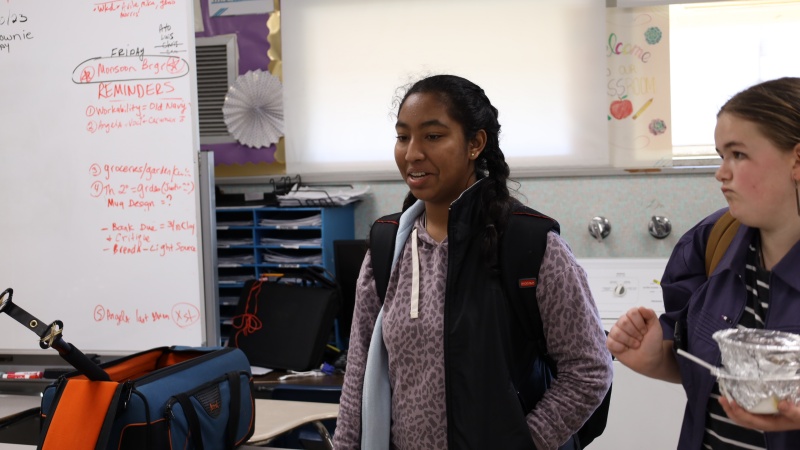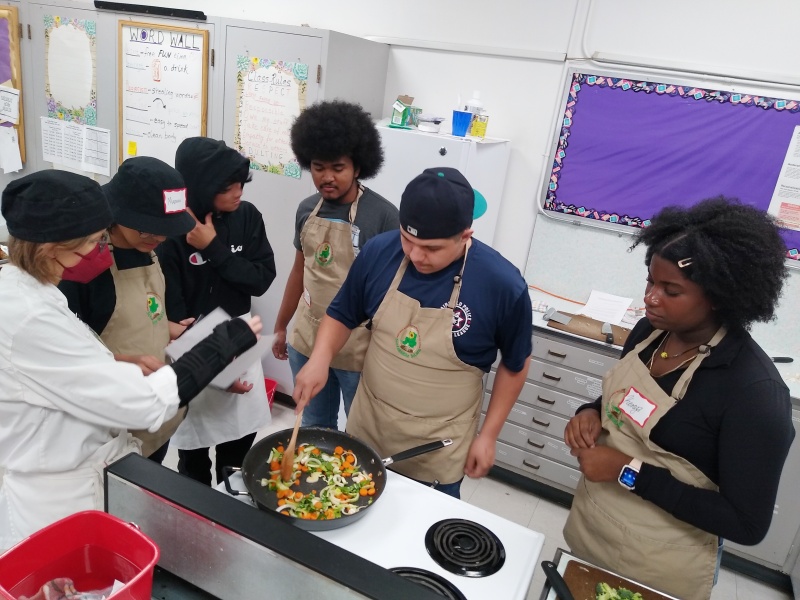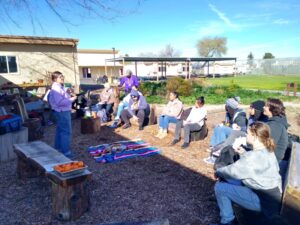The Vision for a SuSol Education Center
By Sustainable Solano
Sustainable Solano has had a vision for a while now: To have an office space that serves as a place of education around the many things we teach about, such as sustainable landscaping, water capture and reuse; cooking with seasonal, sustainable local food; and building community resilience.
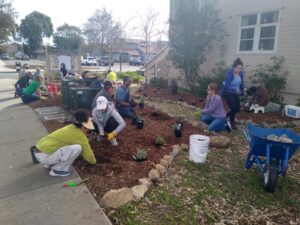 We have been lucky to spend the past few years in our office at the Global Center for Success on Mare Island. This office space puts us near nonprofit partner organizations and the beauty of the Vallejo People’s Garden and the Pollinator Pathway garden we installed with them and Solano RCD in front of the building. But as our team has grown in number, we find there are limitations in a one-room office, both for our team members’ needs as well as ways we would like to interact with all of you in the community.
We have been lucky to spend the past few years in our office at the Global Center for Success on Mare Island. This office space puts us near nonprofit partner organizations and the beauty of the Vallejo People’s Garden and the Pollinator Pathway garden we installed with them and Solano RCD in front of the building. But as our team has grown in number, we find there are limitations in a one-room office, both for our team members’ needs as well as ways we would like to interact with all of you in the community.
And so we are returning to that original vision.
We would love to find a safe and beautiful place where we can create and exhibit the solutions we’ve been teaching and demonstrating for nearly 25 years. These may include a permaculture garden or farm, sustainable water techniques, solar energy and maybe even chickens. There could be a commercial kitchen space for teaching classes and preparing food (or the potential to add such a space). We also need a shared workspace and a place to gather around a table for large team or partner meetings, and an area to house tools and equipment, promotional materials and office files. The property would need to be zoned to allow for office space and would need to be able to support visitors coming to the site for meetings, classes and demonstrations.
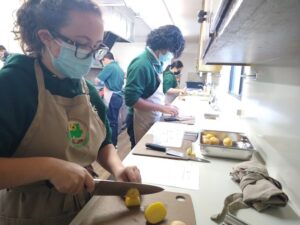 We’ve seen creative and innovative ways individuals, organizations and cities have supported such projects. In Berkeley, the Ecology Center runs EcoHouse, which was founded in 1999 when a group of individuals “collectively purchased and transformed a small, dilapidated North Berkeley home into a demonstration house and garden.” In American Canyon, the city offered up an old public works yard to be transformed into the Napa River Ecology Center in partnership with the American Canyon Community Parks Foundation. Santa Cruz Permaculture now stewards a 26-acre farm under a 30-year lease as part of its operations.
We’ve seen creative and innovative ways individuals, organizations and cities have supported such projects. In Berkeley, the Ecology Center runs EcoHouse, which was founded in 1999 when a group of individuals “collectively purchased and transformed a small, dilapidated North Berkeley home into a demonstration house and garden.” In American Canyon, the city offered up an old public works yard to be transformed into the Napa River Ecology Center in partnership with the American Canyon Community Parks Foundation. Santa Cruz Permaculture now stewards a 26-acre farm under a 30-year lease as part of its operations.
We’d love to hear your ideas and suggestions for supporting this vision! Reach out to us at info@sustainablesolano.org
Even with this active vision for an education center, Sustainable Solano is committed to continuing hands-on sustainable landscaping and resilience-building workshops, cooking classes, and internships within Solano communities, because these are the very heart of our work. Our goal is to bring neighbors together in ways that help them connect with each other, the Earth, and themselves.

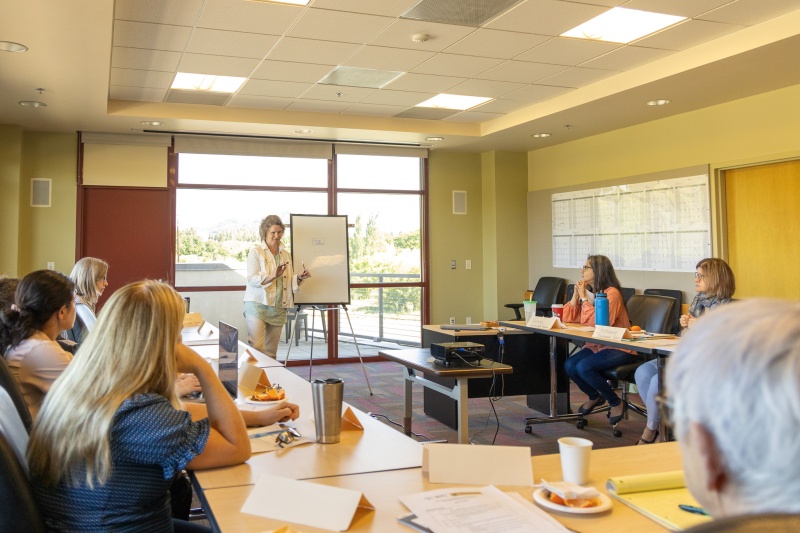
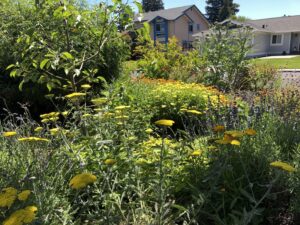 This garden was a front lawn conversion in 2019. It is filled with vegetables, fruits, herbs and more, building healthy soil and harvesting water from the roof.
This garden was a front lawn conversion in 2019. It is filled with vegetables, fruits, herbs and more, building healthy soil and harvesting water from the roof.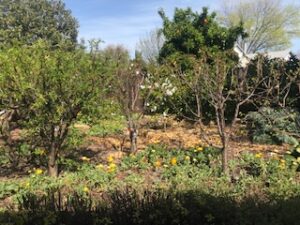 Installed in 2017, this backyard food forest has 21 fruit trees pruned annually to 5 feet, making it easier to access the fruit. The majority of the trees are watered by rain funneled into a swale, while others are watered from the laundry-to-landscape greywater system. An automatic drip system is used during the dry periods. All the fruits are shared with neighbors, friends and family. Additional plantings of salvia and calendula draw in honey bees and hummingbirds.
Installed in 2017, this backyard food forest has 21 fruit trees pruned annually to 5 feet, making it easier to access the fruit. The majority of the trees are watered by rain funneled into a swale, while others are watered from the laundry-to-landscape greywater system. An automatic drip system is used during the dry periods. All the fruits are shared with neighbors, friends and family. Additional plantings of salvia and calendula draw in honey bees and hummingbirds.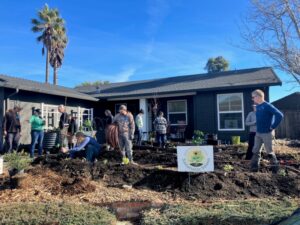 This garden was just planted in January 2023 as a collaborative project between Sustainable Solano and Solano 4-H. Youth members learned about permaculture and designing within the homeowners’ needs, then applied their new knowledge to a plan that includes fruit trees, pollinators and edible annuals. This site is especially susceptible to the western winds, which have annual summer gusts up to 40 mph. The garden is a work in progress as a learning space for 4-Hers for years to come.
This garden was just planted in January 2023 as a collaborative project between Sustainable Solano and Solano 4-H. Youth members learned about permaculture and designing within the homeowners’ needs, then applied their new knowledge to a plan that includes fruit trees, pollinators and edible annuals. This site is especially susceptible to the western winds, which have annual summer gusts up to 40 mph. The garden is a work in progress as a learning space for 4-Hers for years to come.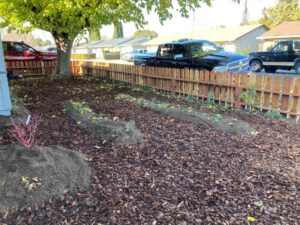 This garden is a demonstration in community and environmental resilience. Homeowners Heidi and Mitch had dealt with a wildfire taking their home in 2020. The garden was designed around a large maple tree, the only thing that survived the fire, and was named in Gaelic to harken back to Mitch’s native Scottish roots. It was installed December 2022.
This garden is a demonstration in community and environmental resilience. Homeowners Heidi and Mitch had dealt with a wildfire taking their home in 2020. The garden was designed around a large maple tree, the only thing that survived the fire, and was named in Gaelic to harken back to Mitch’s native Scottish roots. It was installed December 2022.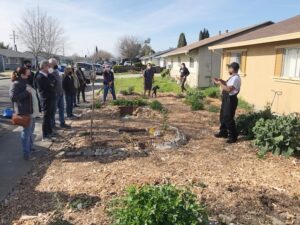 Installed in 2021 to mitigate the effects of flooding, this food forest garden is complete with chickens and a laundry-to-landscape greywater system. This yard has multiple fruit trees and pollinator plants.
Installed in 2021 to mitigate the effects of flooding, this food forest garden is complete with chickens and a laundry-to-landscape greywater system. This yard has multiple fruit trees and pollinator plants.